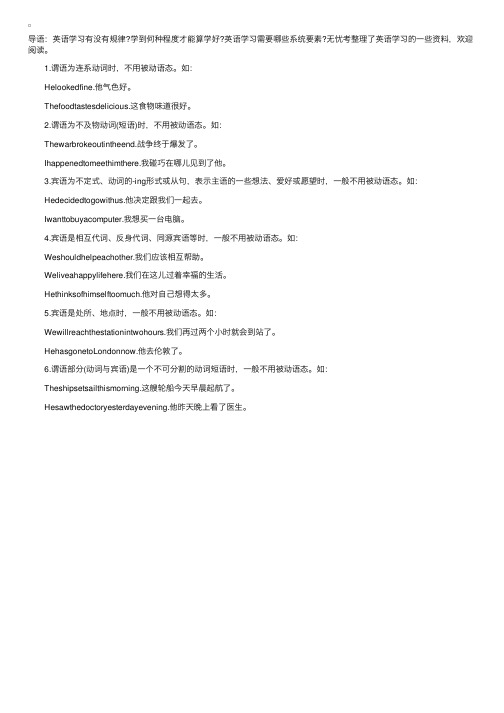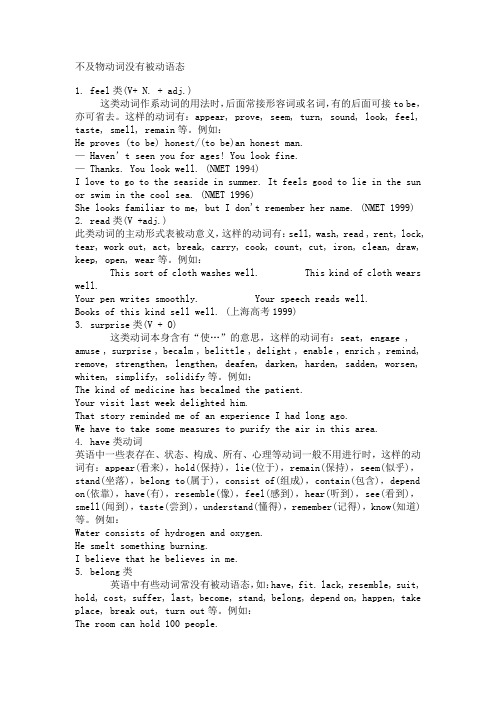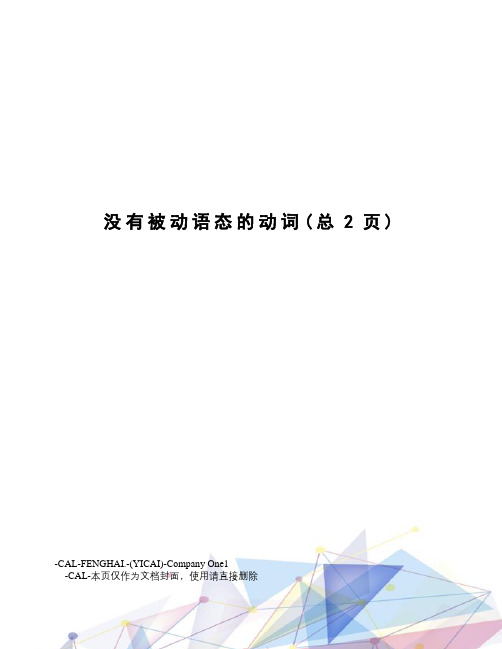没有被动语态的及物动词
英语不能用被动语态的情况

不能用被动语态的情况初中语法:1) 不及物动词或动词短语无被动语态:appear, die disappear, end (vi. 结束), fail, happen, last, lie, remain, sit, spread, stand break out, come true, fall asleep, keep silence, lose heart, take place.After the fire, very little remained of my house.比较:rise, fall, happen是不及物动词;raise, seat是及物动词。
(错) The price has been risen.(对) The price has risen.(错) The accident was happened last week.(对) The accident happened last week.(错) The price has raised.(对) The price has been raised.(错) Please seat.(对) Please be seated.要想正确地使用被动语态,就须注意哪些动词是及物的,哪些是不及物的。
特别是一词多义的动词往往有两种用法。
解决这一问题唯有在学习过程中多留意积累。
2) 不能用于被动语态的及物动词或动词短语:fit, have, hold, marry, own, wish, cost, notice, watch agree with, arrive at / in, shake hands with, succeed in, suffer from, happen to, take part in, walk into, belong to This key just fits the lock.Your story agrees with what had already been heard.3) 系动词无被动语态:appear, be become, fall, feel, get, grow, keep, look, remain, seem, smell, sound, stay, taste, turnIt sounds good.4) 带同源宾语的及物动词,反身代词,相互代词,不能用于被动语态:die, death, dream, live, lifeShe dreamed a bad dream last night.5) 当宾语是不定式时,很少用于被动语态。
英语中不用被动语态的几种情况

英语中不用被动语态的几种情况导语:英语学习有没有规律?学到何种水准才能算学好?英语学习需要哪些系统要素?###整理了英语学习的一些资料,欢迎阅读。
1.谓语为连系动词时,不用被动语态。
如:Helookedfine.他气色好。
Thefoodtastesdelicious.这食物味道很好。
2.谓语为不及物动词(短语)时,不用被动语态。
如:Thewarbrokeoutintheend.战争终于爆发了。
Ihappenedtomeethimthere.我碰巧在哪儿见到了他。
3.宾语为不定式、动词的-ing形式或从句,表示主语的一些想法、爱好或愿望时,一般不用被动语态。
如:Hedecidedtogowithus.他决定跟我们一起去。
Iwanttobuyacomputer.我想买一台电脑。
4.宾语是相互代词、反身代词、同源宾语等时,一般不用被动语态。
如:Weshouldhelpeachother.我们应该相互协助。
Weliveahappylifehere.我们在这儿过着幸福的生活。
Hethinksofhimselftoomuch.他对自己想得太多。
5.宾语是处所、地点时,一般不用被动语态。
如:Wewillreachthestationintwohours.我们再过两个小时就会到站了。
HehasgonetoLondonnow.他去伦敦了。
6.谓语部分(动词与宾语)是一个不可分割的动词短语时,一般不用被动语态。
如:Theshipsetsailthismorning.这艘轮船今天早晨起航了。
Hesawthedoctoryesterdayevening.他昨天晚上看了医生。
没有被动语态的及物动词

没有被动语态的及物动词众所周知,英语的被动语态是由be+及物动词的过去分词构成。
有人认为似乎所有的及物动词都可转换成相应的被动语。
其实不然,至少在某种意义上,有些及物动词不能用于被动语态。
一、当句子的谓语是表示“拥有”、“容纳”、“缺少”概念的及物动词时。
例如:1.The millionaire possesses great wealth.这位百万富翁拥有大量的财富。
不能说:Great wealth is possessed by the millionaire.2.The newly-constructed reservoir holds a lot of water.新水库蓄水量很大。
不能说:A lot of water is held by the newly-constructed reser-voir.3.The house comprises five rooms.这幢房子有五个房间。
不能说:Five rooms are comprised by the house.4,John Smith always lacks confidence.约翰·史密斯总是缺乏自信心。
不能说:Confidence is always lacked by John Smith.二、当句子的谓语是表示“适合”的及物动词,如suit,become,fit等时,没有相应的被动语态。
1.The blue skirt becomes Mary very well.这条蓝裙子玛丽穿上去很合适。
不能说:Mary is become very well by the blue skirt.2.Will the date suit you?这个日子对你合适吗?不能说:Will you be suited by the date?3.We should fit our deeds to our words.我们应该言行一致。
无被动语态的动词

无被动语态的动词除不及物动词无被动语态外,有另外六类动词无被动语态:1.某些表示静态的及物动词:have, suit,hold(容纳),cost,suffer,last(持续)等。
He has a good car.(不说:A good car is had…)他有一辆好汽车。
They were having a bath then.(不说:A bath wasbeing had…)那时他们正在洗澡。
The shoes don't fit me.(不说:I'm not fitted by…)这双鞋不合适我。
He resembles his father.(不说:His father is resembled by…)他长得像他父亲。
The shirt suits me well.(不说:I'm suited by…)这衬衫很合我身。
The room can hold 500 people.(不说:500 peoplecan be held by…)这房间能容纳500个人。
The book cost me five dollars.(不说:I was cost five dollars by…)这本书花了我5美元。
They suffered heavy losses.(不说:They were suffered…)他们损失惨重。
2.某些由及物动词转变的自动词(不需借助宾语即可表达动作,区别他动词,需要借助宾语表达动作)这类动词常见的有:promise(有指望),sell,wash,write,wear,read,break out,run out,give out,add up to,take place,turn out(证实),catch (挂住),等。
The goods sell well.(不说:…are sold…)这些商品畅销。
The clothes wash well.(不说:…are washed…)这些衣服好洗。
英语中不用被动语态的几种情况

导语:英语学习有没有规律?学到何种程度才能算学好?英语学习需要哪些系统要素?⽆忧考整理了英语学习的⼀些资料,欢迎阅读。
1.谓语为连系动词时,不⽤被动语态。
如: Helookedfine.他⽓⾊好。
Thefoodtastesdelicious.这⾷物味道很好。
2.谓语为不及物动词(短语)时,不⽤被动语态。
如: Thewarbrokeoutintheend.战争终于爆发了。
Ihappenedtomeethimthere.我碰巧在哪⼉见到了他。
3.宾语为不定式、动词的-ing形式或从句,表⽰主语的⼀些想法、爱好或愿望时,⼀般不⽤被动语态。
如: Hedecidedtogowithus.他决定跟我们⼀起去。
Iwanttobuyacomputer.我想买⼀台电脑。
4.宾语是相互代词、反⾝代词、同源宾语等时,⼀般不⽤被动语态。
如: Weshouldhelpeachother.我们应该相互帮助。
Weliveahappylifehere.我们在这⼉过着幸福的⽣活。
Hethinksofhimselftoomuch.他对⾃⼰想得太多。
5.宾语是处所、地点时,⼀般不⽤被动语态。
如: Wewillreachthestationintwohours.我们再过两个⼩时就会到站了。
HehasgonetoLondonnow.他去伦敦了。
6.谓语部分(动词与宾语)是⼀个不可分割的动词短语时,⼀般不⽤被动语态。
如: Theshipsetsailthismorning.这艘轮船今天早晨起航了。
Hesawthedoctoryesterdayevening.他昨天晚上看了医⽣。
初中英语语法大全:不用被动语态

初中英语语法大全:不用被动语态各位读友大家好,此文档由网络收集而来,欢迎您下载,谢谢初中英语语法大全:不用被动语态不用被动语态的情况1) 不及物动词或动词短语无被动语态:appear, die disappear, end , fail, happen, last, lie, remain, sit, spread, stand break out, come true, fall asleep, keep silence, lose heart, take place.After the fire, very little remained of my house.比较:rise, fall, happen是不及物动词;raise, seat是及物动词。
The price has been risen.The price has risen.The accident was happened last week.The accident happened last week.The price has raised.The price has been raised.Please seat.Please be seated.要想正确地使用被动语态,就须注意哪些动词是及物的,哪些是不及物的。
特别是一词多义的动词往往有两种用法。
解决这一问题唯有在学习过程中多留意积累。
2) 不能用于被动语态的及物动词或动词短语:fit, have, hold, marry, own, wish, cost, notice, watch agree with, arrive at / in, shake hands with, succeed in, suffer from, happen to, take part in, walk into, belong toThis key just fits the lock.Your story agrees with what had already been heard.3) 系动词无被动语态:appear, be become, fall, feel, get,grow, keep, look, remain, seem, smell, sound, stay, taste, turnIt sounds good.4) 带同源宾语的及物动词,反身代词,相互代词,不能用于被动语态:die, death, dream, live, lifeShe dreamed a bad dream last night.5) 当宾语是不定式时,很少用于被动语态。
有什么一招分清单词是“及物动词”还是“不及物动词”的诀窍?

大多数学生竟然是靠死记硬背来记忆哪些单词及物、哪些单词不及物这不经常搞混才怪(及物动词可以有被动形态啦、不及物动词没有被动语态)英语既然是外国的语言,就应该回归其语言环境下的定义,看看人家是怎样解释的。
及物动词vt其实叫transitive verb;不及物动词vi叫intransitive verbtransitiveverb是指这个动作可以影响、传递给物体,而本身transitive也有传递的意思。
及物、不及物,不都是有个“物”字在里面吗举个栗子I strike the table我对桌子施了“敲”这个动作,于是我把这个动作给了桌子,所以strike这个词是有传递性的,也即所谓的“及物动词”,意为“跟上了物体”。
或者说,我是为了你这个桌子才做的动作。
所以被动语态形式,被施动作的物体桌子成了主体,The table is struck down by me. 桌子被我一掌拍碎了。
有点厉害...不及物动词,英文intransitive verb是主体自己做的动作,原文译 the action remains with the subject.动作没有传递出去,主体留着用吧。
所以一切感官动词都是不及物的呀wake醒来 sleep睡觉 look看 wink眨眼 cry哭、talk说、smile微笑、laugh笑、cough咳、yell叫、eat吃、drink喝、listen听、hear听、smell闻、sniff闻、argue争论、discuss讨论、complain抱怨等等都是无法传递到物体的动作比如我遛弯,我走路,I walk,这个动作是我自己主导自己的。
所以也能理解不及物动词没有被动语态是为什么,没有人说我被我自己走路吧。
不过呢,有些intransitive verb可以used transitively,当成及物动词。
比如 I walk the dog.我溜 。
我做动作是为了这只狗,我自己是不要溜的,所以walk在这里变成了及物动词。
没有被动语态的及物动词

没有被动语态的及物动词众所周知,英语的被动语态是由be+及物动词的过去分词构成。
有人认为似乎所有的及物动词都可转换成相应的被动语。
其实不然,至少在某种意义上,有些及物动词不能用于被动语态。
一、当句子的谓语是表示“拥有”、“容纳”、“缺少”概念的及物动词时。
例如:1.The millionaire possesses great wealth.这位百万富翁拥有大量的财富。
不能说:Great wealth is possessed by the millionaire.2.The newly-constructed reservoir holds a lot of water.新水库蓄水量很大。
不能说:A lot of water is held by the newly-constructed reser-voir.3.The house comprises five rooms.这幢房子有五个房间。
不能说:Five rooms are comprised by the house.4,John Smith always lacks confidence.约翰·史密斯总是缺乏自信心。
不能说:Confidence is always lacked by John Smith.二、当句子的谓语是表示“适合”的及物动词,如suit,become,fit等时,没有相应的被动语态。
1.The blue skirt becomes Mary very well.这条蓝裙子玛丽穿上去很合适。
不能说:Mary is become very well by the blue skirt.2.Will the date suit you这个日子对你合适吗不能说:Will you be suited by the date3.We should fit our deeds to our words.我们应该言行一致。
用法02 无被动语态的情况(解析版)---备战高考英语二轮复习之英语语态“知识条目”高效练

备战2021年高考英语二轮复习之英语语态“知识条目”高效练结构2 无被动语态的情况【要点回顾】1、一般以为凡及物动词都有相应的被动句,其实不然,当“主动宾”结构的谓语动词是表示状态或特征的及物动词,如contain,cost,fit,have,lack,resemble,suit等,主动句便没有相应的被动句:Linda resembles her mother.琳达象她母亲。
This red coat becomes her.这件红上衣合她的身。
The auditorium holds 2000 people.大礼堂能容纳两千人。
My shoes don't fit me.我的鞋不合脚。
Jack always lacks confidence.杰克总是缺乏信心。
但是,状态动词know有相应的被动态:Experts have been known to make this mistake.大家知道,专家也会犯这种错误。
有时,有些不能用于被动语态的状态动词,在同一意义上,如果不用by-词组,可以有被动句。
如:All my things are held in this box.这只箱子里装着我所有的东西。
2、某些被动句没有相应的主动句。
例如:She was born in Nanjing.她生于南京。
He was said to be an honest man.据说他是个老实人。
They will be married next month.他们将于下月结婚。
Mary said that she was not obliged to work overtime.玛丽说她并不是非加班不可。
3、当“主动宾”结构的宾语为反身代词或相互代词时,通常不能转换为被动句。
例如:The doctor dedicated herself to finding a cure.这位医生为寻求一种治疗方法奉献了她的一生。
不及物动词没有被动语态

不及物动词没有被动语态1. feel类(V+ N. + adj.)这类动词作系动词的用法时,后面常接形容词或名词,有的后面可接to be,亦可省去。
这样的动词有:appear, prove, seem, turn, sound, look, feel, taste, smell, remain等。
例如:He proves (to be) honest/(to be)an honest man.—Haven’t seen you for ages! You look fine.— Thanks. You look well. (NMET 1994)I love to go to the seaside in summer. It feels good to lie in the sun or swim in the cool sea. (NMET 1996)She looks familiar to me, but I don't remember her name. (NMET 1999) 2. read类(V +adj.)此类动词的主动形式表被动意义,这样的动词有:sell, wash, read , rent, lock, tear, work out, act, break, carry, cook, count, cut, iron, clean, draw, keep, open, wear等。
例如:This sort of cloth washes well. This kind of cloth wears well. Your pen writes smoothly. Your speech reads well.Books of this kind sell well. (上海高考1999)3. surprise类(V + O)这类动词本身含有“使…”的意思,这样的动词有:seat, engage , amuse , surprise , becalm , belittle , delight , enable , enrich , remind, remove, strengthen, lengthen, deafen, darken, harden, sadden, worsen, whiten, simplify, solidify等。
英语不能用被动语态的若干情况

英语不能用被动语态的若干情况■不及物动词没有被动语态,如rise, happen, succeed, remain, lie, disappear, last等。
如:After the fire, nothing remained.那场大火之后,什么也没留下来了。
误:After the fire, nothing was remained.■不及物动词短语没有被动语态,如:take place, break out, belong to等。
如:Great changes have taken place here since 1990.自1990年以来这里发生了巨大的变化.误:Great changes have been taken place here since 1990.■有的及物动词也没有被动语态,如cost, leave, enter, reach, suit, have, wish,hold, own, lack, fit, resemble, jump, mind等。
如:She entered the room just now.他刚才进过房间。
误:The room was entered by her just now.Tom jumped the queue.汤姆插队。
误:The queue was jumped by Tom.■有些及物的短语动词也没有被动语态,如agree with, arrive at/in, shake handswith, succeed in, suffer from, happen to, walk into, belong to等。
如:I don’t agree with him.我不同意他的看法。
误:He isn’t agreed with by me. ()■宾语是反身代词、相互代词、同源宾语、不定式、v-ing形式及抽象名词等,都不能变为被动句子的主语,如:I taught myself French.我自学法语。
高三复习-怎么区分英语及物和不及物动词

怎么区分英语及物和不及物动词区别在于是否直接跟宾语,及物动词后跟宾语才能表达完整的语义。
不及物动词后不跟宾语,也能够表达具体语义。
及物动词可以用于主动语态,大多有被动语态;不及物动词有主动语态,但没有被动语态。
区分方法1.及物动词(vt):后面必须跟宾语意义才完整的实义动词,叫做及物动词。
比如:I believe that the committee will consider our suggestion.我相信委员会将会考虑我们的建议.这句话里的believe, consider都是及物动词(vt),believe后面跟了宾语从句;consider后面跟了宾语our suggestion2.不及物动词(vi):本身意义完整后面不须跟宾语的实义动词,叫做不及物动词。
比如:1)Birds fly.鸟会飞.fly是不及物动词,因为这一个动词表意完整,无需跟宾语。
2)My watch stopped.我的表停了.Stop是不及物动词,表示“停止”,后面不跟宾语。
3.在英文中还有一种特殊的情况,那就是一个动词兼具及物、和不及物的属性。
比如:之前图片中的act,即可以作为及物动词,表示“扮演、装作”(后面跟宾语);又可以作为不及物动词,表示“行动”。
两用动词英语里有不少实义动词可以兼作及物动词和不及物动词。
这样的动词又有两种不同的情况:a)兼作及物动词和不及物动词时,意义不变。
试比较:Shall I begin at once?我可以立刻开始吗?(begin作不及物动词) She began working as a librarian after she left school.她毕业后当图书馆管理员。
(begin 作及物动词)When did they leave Chicago? 他们是什么时候离开芝加哥的?(leave作及物动词)My watch stopped.我的表停了。
They left last week. 他们是上周离开的。
没有被动语态的动词

没有被动语态的动词作者:佚名文章来源:本站原创及物动词和一些相当于及物动词的动词短语一般有自己的被动语态。
1.The truth must be found out . (动词+副词)2.The slow students shouldn’t be looked down upon. (动词+副词+介词) 上面句子中的动词或动词短语一般有自己的宾语,都可以象这样改为被动语态,但是要注意下列情况。
一、系动词和不及物动词没有被动语态。
She seemed tired after she worked a whole day.常见的系动词look (看起来),sound (听起来),taste (尝起来),smell (闻起来),feel(感到),go(变得),grow (变得)等。
二、一些不能接宾语的动词短语当然也有被动语态。
1.The war broke out in 1937.2.The story took place in a small mountain village.三、甚至有些及物动词和可以接宾语的动词短语要看他们作什么意思讲,有时也只能有主动语态而不宜于用被动语态。
1.We have six classes every day. (上课)2.The hall can hold more than 500 people. (容纳)3.The project lasted 14 years and cost I billion US dollars. (延续) 4.No dish suits all tastes. (适合)类似的还有fit ,catch ,get ,take ,own ,meet 等。
四、而有些动词和短语兼有及物和不及物两种用法,所以前者有被动语态,而后者没有。
1.He serves in the Navy Department. (服役,不及物)2.Hamburger is served in this restaurant. (供应,及物)3.The plane toke off at eight last night. (起飞,不及物)类似的还有look into (作往里看,不及物;作调查、研究,及物)look up (作好转,不及物;作查阅,及物)等。
不用或不能用被动语态的情况

不用或不能用被动语态的情况1. 不及物动词(vi.)没有承受着,所以是不可能用于被动语态的。
如:1)He went home.2)Mr. Li began to speak. The teachers and the students listened carefully.当然,不及物动词(vi.)后面跟上介词时相当于及物动词(vt.),就可以用于被动语态了。
如:Mr. Li began to speak. The teachers and the students listened to him carefully.→Mr. Li began to speak. He was listened to carefully by the teachers and thestudents.2. 有些表示状态的及物动词(vt.)(往往是不能用于进行时的vt.)如have、let、cost、hold(容纳,盛下)等,不表示动作,不可用于被动语态。
如:1)I have some new books. √→Some books are had by me. ×2)The bus holds fifty people. √这个汽车能坐50人。
→Fifty people were held by the bus. ×3. 当及物动词(vt.)所带的宾语是表示地点、处所(有时包括组织、团体)等时,一般不能改为被动语态。
如:1)He left Beijing. √→Beijing was left by him. ×2)He entered(走进)the classroom. √→The classroom was entered by him. ×3)He joined the English club last week. √→The English club was joined by him last week. ×说明:一般地说,判断一个主动句能否转换为被动句,主要看其宾语是否真的受到动作的影响,是否真的“被触及”了。
vi和vt的区别小窍门

vi和vt的区别小窍门虽然vi和vt都属于动词中的实义动词,但是它们之间有很大不同,具体区别如下:一、概念不同1、vi表示不及物动词,英语全称为intranitive verb。
不及物动词所代表的动作没有承受对象,但是动词本身却能够表达完整的意义。
例句:The un rie in the eat。
(太阳从东方升起。
)2、vt表示及物动词,英语全称为tranitive verb。
及物动词所代表的动作必须要有承受对象,如果后面没有承受对象,其本身就不能表达完整的意义。
例如:give(给),teach(教),buy(买),book(预订),find(发现),raie(筹集)等等。
例句:He bought a car yeterday。
(他昨天买了一辆车。
)二、用法不同1、不及物动词(vi)后面不需要跟宾语,特殊情况下,一些不及物动词如果要跟宾语,则两者之间一定要加上相应的介词。
例句1:They go there by bu every week。
(他们每周乘公交车去那儿。
)go在句中作不及物动词(vi),后面没有宾语。
例句2:She arrived in New York yeterday。
(她昨天到达纽约的。
)不及物动词arrive后面跟宾语New York要加介词in。
例句3:Don't liten to muic in cla。
(不要在课堂上听音乐。
)在句中liten是不及物动词,后面跟宾语muic时,需要在两者之间加上介词to。
例句4:Pleae look at the blackboard carefully。
(请仔细看黑板。
)在句中look作不及物动词,后面跟宾语the blackboard时,需要在两者之间加上介词at。
2、及物动词(vt)后面一定要跟宾语,跟宾语时有三种结构:(1)及物动词+单宾语例句:I love you。
(我爱你。
)及物动词love后面跟了一个宾语you。
(2)及物动词+双宾语例句:He gave me a book。
不及物动词或动词短语无被动语态

l) 一词多义的动词往往有两种用法如:read, wear, draw(临近,逼近,开走), write, drive, wash, smell, record, tire, cut, shut, sell, measure, weight, seat, hold …This knife cuts easily. 这刀子很好用。
The beef cuts tough.这牛肉难切.He cut his fingers carelessly. 他不小心割破了手指.The cloth washes well.这衣服好洗.I am going to wash these clothes.我去洗衣服.The coat wears well.这上衣耐洗.He wore a raincoat.他穿着雨衣.Her voice records well.她的声音录得很好.Please record whatever she says.She tires easily.她容易累.She is very tired.她累了.The car drives easily.这车容易开.I like driving a car.我喜欢开车.The pen writes smoothly.这笔写起来流畅.The fish smells.这鱼发臭了.The flowers do smell sweet. 这些花儿闻起来着实香She was smelling the flowers她在闻花.He goes in and the door shuts behind him.他走进来后, 门随即关上了.What time does the shop shut?这店何时关门?The car drew off.车开走了.The night was drawing nearer.夜幕降临.The book sells well. 这本书销路好。
没有被动语态的动词

没有被动语态的动词(总2页) -CAL-FENGHAI.-(YICAI)-Company One1-CAL-本页仅作为文档封面,使用请直接删除没有被动语态的动词一。
常见的系动词look (看起来),sound (听起来),taste (尝起来),smell (闻起来),feel(感到),go (变得),grow (变得)等。
二、一些不能接宾语的动词短语也没有被动语态。
1.The war broke out in 1937.(break out,爆发)2.The story took place in a small mountain village.(发生,take place) 三、甚至有些及物动词和可以接宾语的动词短语要看他们作什么意思讲,有时也只能有主动语态而不宜于用被动语态。
1.We have six classes every day. (have,上课)2.The hall can hold more than 500 people. (held,容纳)3.The project lasted 14 years and cost I billion US dollars.(last,延续)4.No dish suits all tastes. (suit,适合)类似的还有fit ,catch ,get ,take ,own ,meet 等。
四、而有些动词和短语兼有及物和不及物两种用法,所以前者有被动语态,而后者没有。
1.He serves in the Navy Department. (服役,不及物)2.Hamburger is served in this restaurant. (供应,及物)3.The plane toke off at eight last night. (起飞,不及物)类似的还有look into (作往里看,不及物;作调查、研究,及物) look up (作好转,不及物;作查阅,及物)等。
及物动词并非都能用于被动语态

及物动词并非都能用于被动语态四川省彭州中学樊文生(该文系本人原创,曾发表于全国核心期刊《中小学外语教学》)由于被动语态不完全从属于主动语态,因此并不是所有带宾语的及物动词的主动结构都可以改为被动结构。
在不少情况下,带宾语的主动句不能改为被动句。
常见的情况有以下十六种:一. 一些表示状态的及物动词谓语是表示状态的一些及物动词,如 fail, last, suit, contain, own, hold, fit, cost, lack, want(缺少), become, flee, have(有、吃、患病)等。
例如:The hall holds 1,000 people. 大厅可容纳1,000人。
不能说:1,000 people are held in the hall.He has a new dictionary. 他有一本新字典。
I have bad colds every year. 我每年都要患重感冒。
The jacket does not fit you. 这件衣服不合你身。
We have lunch at 12:30. 我们十二点半吃午饭。
Does the pair of shoes suit you? 你穿这双鞋合适吗?Who owns this land? 这块地属谁所有?He never fails to write to his mother every week.•他每周给他妈妈写信。
The pay could last the girl only a few days. •这工资只能维持那女子几天的生活。
She lacks experience. 他缺少经验。
*但 have 一词不作“有、吃、患病”讲时,却可以有被动语态。
例如:I'm afraid you've been had.(= have been cheated) 恐怕你受骗了。
There was no butter to be had.(to be bought) 黄油买不到。
- 1、下载文档前请自行甄别文档内容的完整性,平台不提供额外的编辑、内容补充、找答案等附加服务。
- 2、"仅部分预览"的文档,不可在线预览部分如存在完整性等问题,可反馈申请退款(可完整预览的文档不适用该条件!)。
- 3、如文档侵犯您的权益,请联系客服反馈,我们会尽快为您处理(人工客服工作时间:9:00-18:30)。
众所周知,英语的被动语态是由be+及物动词的过去分词构成。
有人认为似乎所有的及物动词都可转换成相应的被动语。
其实不然,至少在某种意义上,有些及物动词不能用于被动语态。
一、当句子的谓语是表示“拥有”、“容纳”、“缺少”概念的及物动词时。
例如:
1.The millionaire possesses great wealth.这位百万富翁拥有大量的财富。
不能说:Great wealth is possessed by the millionaire.
2.The newly-constructed reservoir holds a lot of water.新水库蓄水量很大。
不能说:A lot of water is held by the newly-constructed reser-voir.
3.The house comprises five rooms.这幢房子有五个房间。
不能说:Five rooms are comprised by the house.
4,John Smith always lacks confidence.约翰·史密斯总是缺乏自信心。
不能说:Confidence is always lacked by John Smith.
二、当句子的谓语是表示“适合”的及物动词,如suit,become,fit 等时,没有相应的被动语态。
1.The blue skirt becomes Mary very well.这条蓝裙子玛丽穿上去很合适。
不能说:Mary is become very well by the blue skirt.
2.Will the date suit you?这个日子对你合适吗?
不能说:Will you be suited by the date?
3.We should fit our deeds to our words.我们应该言行一致。
不能说:Our deeds should be fitted to our words by us.
三、当句子的谓语是表示“相互作用”的及物动词,如:equal,mean,resemble等时。
1.No one equals him in intelligence.他的智力是无与伦比的。
不能说:He is equaled by no one in intelligence.
2.Revolution means liberating productive force.革命就是解放生产力。
不能说:Liberating productive force is meant by revolution.
3.The two boys resemble each other in appearance.这两个男孩长得相似。
不能说:Each other is resembled by the two boys in appearance.
四、当句子的谓语是表示“明白”意义的及物动词,如:get,catch,take 时,也没有相应的被动语态。
1.The boy said,“I didn’t catch the last two words.”这个男孩说:“我没听清楚最后两个词。
”
不能说:The boy said,“The last two words weren’t caught by me.”
2.I don’t take you at all.你说的我一点也不懂。
不能说:You aren’t taken by me a t all.
五、动词have作“有、接受、度过、吃、经历”解时,没有被动语态。
1.I have five good dictionaries.我有五本好词典。
不能说:Five good dictionaries are had by me.
2.I had three letters from Mr.Green.我收到过格林先生三封信。
不能说:Three letters were had by me from Mr.Green.
3.We shall have a good Spring Festival.我们将过一个愉快的春节。
不能说:A good Spring Festival will be had by us.
4.I usually have breakfast at half past six.我通常六点半吃早饭。
不能说:Breakfast is usually had by me at half past six.
六、当及物动词last表示“持续”、“经久”的含义时,也没有相应的被动语态。
This coat has lasted me five years.这件外衣我已穿了五年。
不能说:I have been lasted five years by this coat.
七、及物动词cost表示“价值”、“花费”意义时,没有被动语态。
That project cost them too much in man-power,material and money.那项工程耗费了他们大量的人力、物力和财力。
不能说:They were cost too much in manpower,material and money by the project.
八、及物动词“befall”表示“临到……头上”,“发生于”之意时,没有被动语态。
A succession of misfortunes befell the poor little girl.这个可怜的女孩遭受了种种不幸。
不能说:The poor little girl was befallen by a succession of misfortunes.
综上所述,并非所有的及物动词都可用于被动语态。
所以我们要仔细辨析,以免用错。
